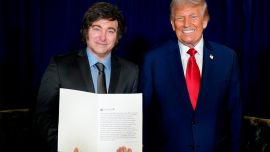Thousands of people marched through Buenos Aires on Wednesday to mark International Workers’ Day, with demonstrators voicing strong opposition to President Javeir Milei’s proposed labour reforms.
Demonstrators, both independent and those affiliated to trade unions, carried banners pronouncing their criticism of Milei’s austerity measures and intention to trim and alter labour laws he views as detrimental to business.
"We see ourselves having to repudiate a labour reform that rolls back workers' rights, so this becomes a day of struggle and protest," Maia Volcovinsky, a member of the board of directors of the massive General Confederation of Labour (CGT) umbrella union grouping.
The CGT has called for a national strike next week. The May 9 rally will be the second national walkout of the Milei’s government so far. The La Libertad Avanza leader only took office last December.
"The homeland is not for sale. On the streets to change lives and defend rights," the union published on its social media accounts.
The government’s proposed labour reforms – contained in the sweeping ‘omnibus’ bill that is currently before Congress – extend the probationary period for new employees from three to six months and even up to a year in some cases. It also strips away fines for companies that use unregistered workers to incentivise the formalisation of such employees, and proposes big changes to redundancy payment law.
Although it has already been approved in the lower house Chamber of Deputies, the bill still faces debate in the upper chamber Senate, where Milei’s party has only seven of the 72 senators.
In a communiqué issued as workers took to the streets, CGT repudiated the measures taken by the Milei government and its intended changes.
"When all social, labour, trade union and social security rights are threatened, it is a day of vindication and defence of the conquests and acquired rights that are intended to be violated," the CGT’s authorities said.
Trade union and political groups staged events all over the country, with the largest gathering in downtown Buenos Aires. Long columns of people could be seen carrying banners through the city centre.
"We are facing a government that does not understand workers, their struggle and the unions that defend workers. So we are going to have difficult days and moments if this government does not change its attitude towards workers," said Rubén Aguiar, a baker and union leader.
In the famed Plaza de Mayo square, in downtown Buenos Aires, an act was staged by leaders from the “United Left,” bringing together left-wing parties, laid-off state workers, the retired and students. A document was read out that featured strong criticism of the government.
There was room for some curious postcards on the day, such as a woman who sang a tango in homage to Eva Perón from her open window onto the street.
"Having so many comrades here fills me with emotion, I pray to God for strength to finally see this country liberated from those who are the enemies of the workers," the woman told the C5N news channel.
Across Latin America
Mass rallies took place all over Latin America on Wednesday.
Colombian President Gustavo Petro used a May Day rally to announce his government was cutting diplomatic ties with Israel, whose leader he described as "genocidal" over the war in Gaza.
Brazilian president Luiz Inácio Lula da Silva, a former union leader, vowed to "make the very rich pay more" in an address to gathered workers in São Paulo.
In Caracas, workers demonstrating against low wages clashed with supporters of Venezuelan President Nicolás Maduro on motorcycles.
In Santiago, some five thousand people marched to demand better wages and working conditions. Some ministers of Gabriel Boric's leftist government joined the rally.
Workers carrying Cuban flags and portraits of their late leader Fidel Castro (1926-2016 also took to the streets in Cuba, although in smaller numbers than in previous years.
In Uruguay, the PIT-CNT focused its complaints on reform of the current social security system, which will go to a referendum in October, in parallel with the national elections.
– TIMES/NA/AFP
























Comments